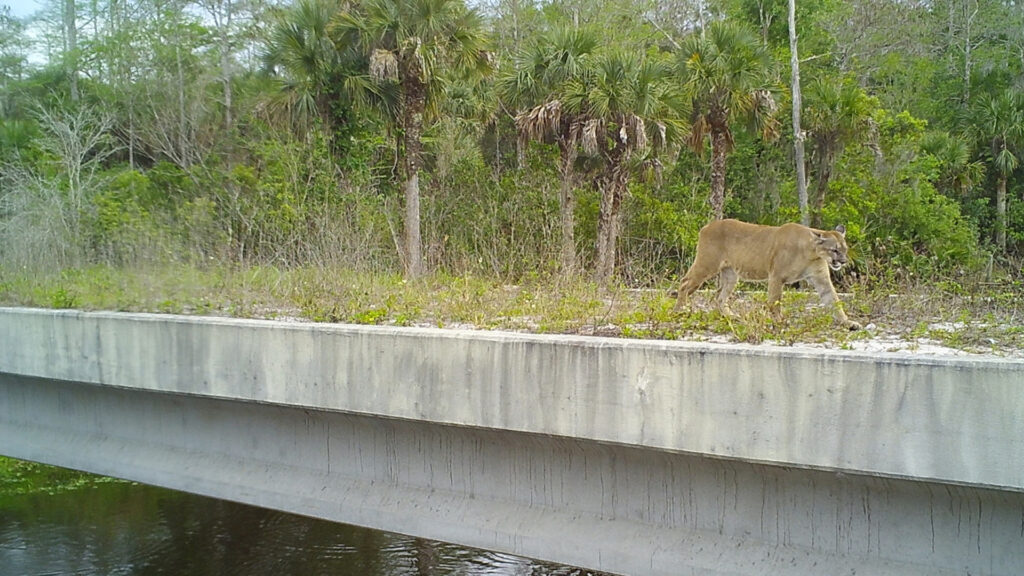By Tia Russell, UCF Student PIRG
Nationally, there are over 1 million wildlife and vehicle collisions per year, resulting in hundreds of deaths. This problem majorly impacts Florida with its endangered wildlife population.
In the first half of 2024 alone, 12 panthers have been killed by vehicle collisions in Florida. Though this number may seem insignificant, panthers are an endangered species, and only 120 to 230 of them remain in the Florida wild. The death of panthers due to collisions is preventable, and the solution is simple: building wildlife crossings along Florida highways.

Wildlife crossings are additions to roads, typically an underpass or an overpass, that allow animals to cross over highways, ensuring the safety of both the animals and the drivers. They have been a staple of Florida infrastructure since 1972, and there are more than 60 on Florida highways for panthers to date. They allow animals to safely and effectively cross highways, they don’t interfere with traffic and — most importantly — they are safe.
Additionally, studies have shown that wildlife crossings with fencing reduce wildlife and vehicle collisions by up to 97%. It’s not only safer for the panthers, it’s safer for the people who are driving on roads where panthers live.
While the functional idea of wildlife crossings is easy to understand and agree with, the biggest hurdle to their construction is funding. Funding for wildlife crossings is only introduced when a road needs to be expanded or otherwise worked on, meaning that panthers will continue to die as long as a road is in good condition.
However, other states have found a solution. The New York State Senate recently passed the Wildlife Crossings Bill, which allows them to take advantage of the $350 million of federal funds set aside for wildlife crossings by the Biden administration. It requires the Department of Transportation to identify high-risk sites for wildlife and to designate federal funds for the construction of wildlife crossings in the top five most dangerous areas.
The bill was passed nearly unanimously, with 55 yes votes and only four no votes, and now it faces the New York Assembly. This policy approach could easily be adopted in Florida and may help the Florida Department of Transportation secure federal funds to build crossings.
These federal funds are already available to be taken advantage of, and it’s clear that the issue of animal death is bipartisan, with bills such as the Recovering America’s Wildlife Act passing the U.S. House in 2022 with support from 12 Florida representatives, and showing strong support in the Senate this year with a signature from Republican Sen. Marco Rubio. Passing a Wildlife Crossings bill in Florida would allow the Florida Department of Transportation to better take advantage of the funds that have already been allotted.

If legislation in Florida were to pass a bill similar to the one in New York, it would allow wildlife crossing construction to receive 80% of its funding from federal grants. Currently, in Florida, wildlife crossings are often paired with existing roadwork needs, not necessarily where wildlife need them most. With this type of funding, wildlife crossings would be able to be constructed even when the road itself is in good condition. That way, panthers would not continue to be killed because a road hasn’t needed to be worked on.
Additionally, roads that are being constructed will have significantly more funding for wildlife crossings, allowing for more expensive additions such as fencing.
A bill like the one making its way through the New York Assembly should be introduced in Florida, and soon. It’s bipartisan and it would protect both Florida’s endangered animals and Florida drivers. Furthermore, Republicans and Democrats have come together on wildlife conservation bills before, such as the Wildlife Corridors Act, meaning that a bill supporting wildlife crossings could pass the state legislature.
Furthermore, Gov. Ron DeSantis himself has encouraged the construction of wildlife crossings and has approved over $129 million in wildlife crossing funding over the past five years. The governor’s support for a bill like this is essential, paving the way for negotiation between both parties.
Contact your legislator and ask them to support initiatives that will fund wildlife crossing construction. Floridians have the power to protect endangered wildlife, and it’s time that Florida highways become safer for both animals and people.
Tia Russell is a student organizer with the University of Central Florida Student PIRG (Public Interest Research Group).
If you are interested in submitting an opinion piece to The Invading Sea, email Editor Nathan Crabbe at nc*****@*au.edu. Sign up for The Invading Sea newsletter by visiting here.



